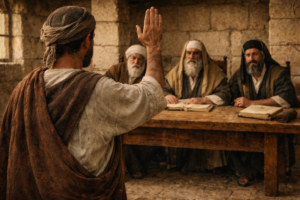When The People Come First
ADAPTED FROM HIS AUDIO SHIUR ON EIN YAAKOV LESSON 73B
The Power of Blessing
In Parshas Naso, we encounter one of the most beautiful and well-known passages in the Torah: Birkas Kohanim, the Priestly Blessings. The Kohanim stand before the congregation and bestow Hashem’s blessing—words of protection, grace, and peace— upon the Jewish people.
But behind this moment lies a powerful halachic and spiritual lesson: the Kohanim face the people, and their backs are turned to the Heichal, the place of the Shechinah. Why is this permitted? Why is this the proper way? From this halacha, the Gemara teaches us something profound about the respect due to the Kahal Yisrael, the Jewish community.
Respect and Awe for the Public
The Gemara says that a person should always show respect and fear for the public—what we might call stage fright. A person standing before the public should show the respect that is due to them. Never look down upon a crowd.
As an example, the Gemara gives a case that is found in many places: When the Kohanim stand up on the platform in the shul, to bless the Jews, they face the congregation with hands outstretched. They deliver the berachah with their backs facing the Heichal, the Aron Kodesh, where the Shechinah is.
This would seem disrespectful—turning one’s back to the Heichal and facing the people. And yet, the Gemara says this is the proper way. A person should show such respect for a kahal, a group of Jews, that even this takes precedence.
The Shechinah Honors Am Yisrael
Hashem desires that more respect be given to the Kahal Yisrael than even to the Shechinah itself. We find that Hashem is more particular about the kavod of Tzaddikim and of the Jewish people than of His own honor.
This, too, shows that the ultimate degree of modesty is found in Hashem Himself. In all cases, the kavod that Hashem demands for the Tzaddikim and for the Jewish people is the utmost.
600,000 Letters, 600,000 Souls
For example, the seforim say that speaking any word against a Jew is sacrilegious. The Sefer Torah, as an example, is said to contain 600,000 letters. While it actually has 305,804 letters exactly, it is traditionally called 600,000 for various mathematical reasons. These 600,000 letters correspond to the 600,000 root souls of the Jewish people.
The word Yisrael—ישראל—can be seen as an acronym: “Yesh Shishim Ribo Otiot LaTorah” (There are 600,000 letters in the Torah.)
If a person speaks lashon hara—slander—about a Jew, one might think: there are still 599,999 Jews who are good, what harm is he doing by speaking about just one?
But the answer is: if even one letter in a Sefer Torah is erased or slightly damaged, the entire Sefer Torah becomes pasul—unfit for use. It is not just the one letter that is invalid; the entire scroll becomes invalid.
In the same way, speaking against one Jew is like speaking against the entire nation, the entire Am Yisrael.
The Face of Blessing
This is the degree of kavod that Hashem demands of Jews for one another. Therefore, the Kohanim, when they give this berachah to the Jews, stand with their face toward the people—even though their back is to the Heichal.
Even the Rabbi himself, when delivering a derashah, faces the people. His back is to the Heichal. That is the proper way. That is the way the Torah wants it.
Honor Everyone!
From the halachos of Birkas Kohanim in Parshas Naso, we learn a foundational principle of Judaism: every Jew is holy, and the collective soul of the Jewish people is sacred. Hashem Himself shows us that the honor of each individual—and of the community as a whole—takes precedence, even over His own.
Let us take this lesson to heart and treat every fellow Jew with deep kavod, care, and love. In doing so, we bring blessing not only to them, but to the entire nation.
- 0 comment





















